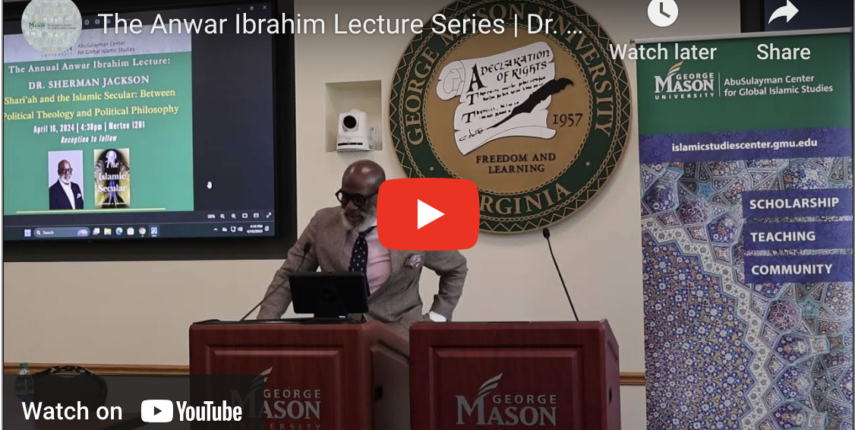
Shari’ah and the Islamic Secular: Between Political Theology and Political Philosophy
The Annual Anwar Ibrahim Lecture @AbuSulayman Center for Global Islamic Studies at George Mason University; delivered by Dr. Sherman Jackson on April 16, 2024.
Overview of the “Islamic Secular”
The basic point of the secular in the modern West is to “liberate” certain pursuits–the state, the economy, science–from the authority of religion. This is also assumed to be the goal and meaning of “secular” in Islam. Sherman Jackson argues, however, that that assumption is wrong. In Islam the “secular” was neither outside “religion” nor a rival to it. “Religion,” in Islam was not identical to Islam’s “sacred law,” or “shari’ah.” Nor did classical Muslim jurists see shari’ah as the all-encompassing, exclusive means of determining what is “Islamic.” In fact, while, as religion, Islam’s jurisdiction was unlimited, shari’ah’s jurisdiction, as a sacred law, was limited. In other words, while everything remained within the purview of the divine gaze of the God of Islam, not everything could be determined by shari’ah or on the basis of its revelatory sources. Various aspects of state-policy, the economy, science, and the like were “differentiated,” from shari’ah and its revelatory sources, without becoming non-religious or un-Islamic. Given the asymmetry between the circumference of shari’ah and that of Islam as religion, not everything that fell outside the former fell outside the latter. In other words, an idea or action could be non-shar’i (not dictated by shari’ah) without being non-Islamic, let alone anti-Islam. The ideas and actions that fall into this category are what Jackson terms “the Islamic Secular.”
Crucially, the Islamic Secular differs from the Western secular in that, while the whole point of the Western secular is to liberate various pursuits from religion, the Islamic Secular differentiates these disciplines not from religion but simply from shari’ah. Similarly, while both secularization and secularism play key roles in the Western secular, both of these concepts are alien to the Islamic Secular, as the Islamic Secular seeks neither to discipline nor to displace religion, nor expand to its own jurisdiction at religion’s expense. The Islamic Secular is a complement to religion, in effect, a “religious secular.” Nowhere are the practical implications of this more impactful than in Islam’s relationship with the modern state. In this book, Jackson makes the case for the Islamic Secular on the basis of Islam’s own pre-modern juristic tradition and shows how the Islamic Secular impacts the relationship between Islam and the modern state, including the Islamic State.
About Sherman A. Jackson
Sherman A. Jackson is the King Faisal Chair of Islamic Thought and Culture, Distinguished Professor of Religion, Professor of American Studies and Ethnicity and Director of the Center for Islamic Thought, Culture and Practice (CITCAP) at the University of Southern California. He is author of Islamic Law and the State: The Constitutional Jurisprudence of Shihāb al-Dīn al-Qarāfī (Brill, 1996), On the Boundaries of Theological Tolerance in Islam: Abū Hāmid al-Ghazālī’s Fayṣal al-Tafriqa (Oxford, 2002), Islam and the Blackamerican: Looking Towards the Third Resurrection (Oxford, 2005), Islam and the Problem of Black Suffering (Oxford, 2009), Sufism for Non-Sufis: Ibn ‘Aṭā’ Allāh al-Sakandarī’s Tāj al-‘Arūs (Oxford 2012), and Initiative to Stop the Violence: Sadat’s Assassins and the Renunciation of Political Violence (Yale, 2015). His latest and most accomplished publication is The Islamic Secular (Oxford, 2024). He has authored numerous articles on various aspects of Islamic law, theology, history and Islam and Muslims in modern America. He is listed by Religion Newswriters Foundation’s ReligionLink as one of the top ten experts on Islam in America. And he has been named several times, including in 2023, among the top 500 most influential Muslims in the world by the Royal Islamic Strategic Studies Center in Amman, Jordan and the Prince Alwaleed Bin Talal Center for Muslim-Christian Understanding. And he is among the founding scholars of the American Learning Institute for Muslims. Among his proudest moments, however, was the eulogy he delivered at the funeral of the legendary American Muslim, Muhammad Ali. His work as a scholar and intellectual is uniquely devoted to placing the classical Islamic intellectual, religious, and spiritual tradition into robust and meaningful conversation with the challenges and opportunities confronting Muslims in the modern world.

